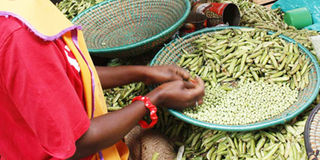Peas are back in season and cheaper

Although they may still be expensive, peas have increased on the market and there has been a noticeable price reduction.
Due to the rains, cowpeas are in season! Ms Mary Akello, a trader in Kibuli, says that the cowpeas have been in season for one month now. This has led to reduction of the cowpeas prices in most parts of the country. The prices have been reduced by more than Shs500. However, the prices are not as low as they were a year ago.
“I have reduced my prices by Shs2,000. Last month, I was selling 1kg of fresh cowpeas at Shs10,000 but now I am selling the same at Shs8,000,” Akello says, adding that she has reduced the prices because there is so much on the market currently. “There are those traders who have decided to take the product to people by moving from door to door and selling at a much cheaper price,” she says.
Akello says that when the product tends to be abundant on the market, they automatically have to reduce the prices, especially if it is perishable. If cowpeas are kept for long, say more than a week, she says that they will start rotting or even sprouting. The rotting and sprouting is also attributed to other factors like poor storage. The cowpeas should not be stored in a wet area because that causes moisture.
“The good thing is there is always market for the seeds so we don’t have to keep them for long. People may complain of the high prices but they still buy them because they love them.” Akello says.
On the market, there are green and yellow cowpeas. The dry cowpeas are both green and yellow while the fresh ones are mostly green.
“Most people prefer the green cowpeas because they make good soup,” Mr Kenneth Nduhukire, a trader in Mulago says.
According to Mr Nduhukire, cowpeas that are sold all over the country mainly come from the eastern and northern regions. These regions provide perfect and favourable weather for the crop to grow well. The cowpeas grow well in any kind of soils and can stand hot weather with a minimum amount of water.
Though there was a longstanding drought that could have led to the scarcity of the crop, Mr Nduhukire says that some times, the crop may not be in season due to pests that are known to attack cowpeas. He says, “When a pest attacks one crop, it usually spreads to the whole garden and if it’s not detected early, it usually can cause huge losses to the farmer which leads to few cowpeas on the market.”
However, he says that scarcity may also be caused by the few farmers who may decide to grow the crop.
According to infortradeuganda.com the crop has been considered as the country’s potential agricultural export candidate. And in the country, cowpeas are ranked the third most preferred legume by the people.




